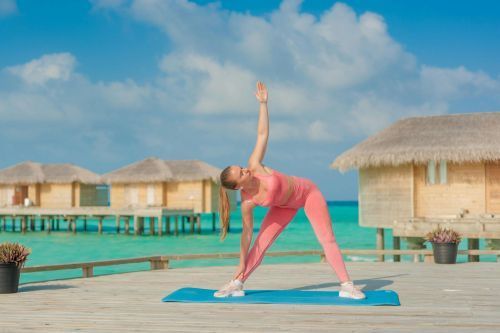The Role of Sleep in Fitness and Recovery: Tips for a Restorative Night's Rest
The Role of Sleep in Fitness and Recovery: Tips for a Restorative Night's Rest

The Role of Sleep in Fitness and Recovery: Tips for a Restorative Night's Rest
Sleep is a cornerstone of health and well-being, playing a critical role in fitness and recovery. While exercise and nutrition often receive the spotlight in discussions about fitness, quality sleep is just as essential. Adequate rest not only helps the body recover from physical activity but also enhances performance and overall health. This blog delves into the importance of sleep in fitness and recovery and provides tips for achieving a restorative night's rest.
The Importance of Sleep in Fitness and Recovery
1. Muscle Repair and Growth
During sleep, the body goes into repair mode. Protein synthesis, the process by which cells build proteins, occurs predominantly during deep sleep. These proteins are vital for repairing and building muscle tissue, which is stressed and damaged during exercise. Growth hormone, essential for muscle development and overall recovery, is also released in higher quantities during sleep.
2. Energy Restoration
Physical activities deplete glycogen stores in muscles. During sleep, these stores are replenished, providing the energy needed for the next day's activities. Adequate sleep ensures that you wake up refreshed and ready to perform, whether it's a workout or daily tasks.
3. Hormonal Balance
Sleep regulates various hormones that influence muscle growth, appetite, and stress. For instance, insufficient sleep can lead to elevated cortisol levels, a stress hormone that can hinder muscle repair and increase fat storage. Conversely, sleep boosts the production of testosterone and growth hormone, which are crucial for muscle growth and recovery.
4. Mental Recovery
Sleep is vital for cognitive functions such as memory, focus, and decision-making. A well-rested mind can better handle the mental demands of training, such as learning new exercises or maintaining motivation. Mental recovery through sleep also reduces the risk of burnout and helps maintain a positive attitude towards fitness goals.
Tips for a Restorative Night's Sleep
1. Maintain a Consistent Sleep Schedule
Going to bed and waking up at the same time every day helps regulate your body's internal clock, making it easier to fall asleep and wake up. Aim for 7-9 hours of sleep each night to allow sufficient time for all the restorative processes to occur.
2. Create a Sleep-Friendly Environment
Your bedroom should be conducive to sleep. Ensure it's cool, dark, and quiet. Consider using blackout curtains, white noise machines, or earplugs to eliminate disturbances. A comfortable mattress and pillows are also essential for a good night's sleep.
3. Limit Screen Time Before Bed
The blue light emitted by phones, tablets, and computers can interfere with the production of melatonin, the hormone that regulates sleep. Try to avoid screens at least an hour before bedtime. Instead, engage in relaxing activities such as reading a book, taking a warm bath, or practising meditation.
4. Watch Your Diet and Hydration
Avoid large meals, caffeine, and alcohol close to bedtime. These can disrupt your sleep cycle and reduce the quality of sleep. Instead, opt for a light snack if you're hungry, and stay hydrated throughout the day but reduce fluid intake in the evening to minimise night-time awakenings.
5. Exercise Regularly
Regular physical activity can improve sleep quality by reducing stress and anxiety and promoting a more restful sleep. However, try to finish intense workouts at least a few hours before bedtime, as exercising too close to bedtime can have the opposite effect.
6. Practice Relaxation Techniques
Incorporate relaxation techniques such as deep breathing, progressive muscle relaxation, or yoga into your nightly routine. These practices can help calm your mind and prepare your body for sleep, making it easier to drift off and stay asleep.
7. Manage Stress and Anxiety
Chronic stress and anxiety can severely impact sleep quality. Address these issues through activities that promote relaxation and mental health, such as mindfulness meditation, journaling, or seeking support from a mental health professional.
Conclusion
Sleep is a fundamental component of fitness and recovery, playing a crucial role in muscle repair, energy restoration, hormonal balance, and mental well-being. Prioritising quality sleep can significantly enhance your physical performance and overall health. By adopting healthy sleep habits and creating an environment conducive to rest, you can ensure that your body and mind receive the restorative benefits they need. Embrace the power of sleep and watch your fitness and recovery soar to new heights.







